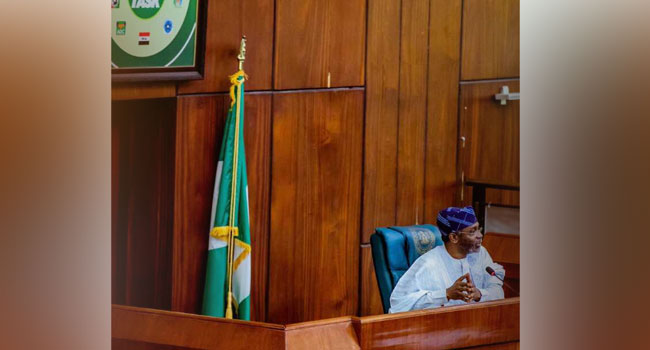
Speaker of the House of Representatives Femi Gbajabiamila on Tuesday said the Control of Infectious Diseases Bill was conceived in the best interest of the Nigerian people and no one else.
Gbajabiamila while addressing his colleagues at the resumption of the plenary session said since the introduction of the Bill a week ago, there has been a barrage of criticisms against it, with allegations of sinister motives.
The Speaker said the allegation that the Bill is a sinister attempt to turn Nigerians into guinea pigs for medical research while taking away their fundamental human rights was far from the truth.
“None of these allegations are true. Unfortunately, we now live in a time when conspiracy theories have gained such currency that genuine endeavours in the public interest can quickly become mischaracterised and misconstrued to raise the spectre of sinister intent and ominous possibility.
“This House of Representatives will never take any action that purposes to bring harm to any Nigerian here at home or abroad. As we have thus far shown by our conduct, the resolutions and actions we take in this 9th House of Representatives will always be in the best interests of the Nigerian people who elected us, and no one else.
“In the recent uproar, certain fundamental truths have been lost and are worth remembering. Our current framework for the prevention and management of infectious diseases is obsolete and no longer fit for purpose. The current law severely constrains the ability of the Federal Government of Nigeria and the Nigeria Centre for Disease Control (NCDC) to take proactive action to prevent the entry into Nigeria of infectious diseases and the management of public health emergencies when they occur,” he said.
The Speaker added that he disagrees with the NCDC boss that this is not the ideal time to seek reforms and create a bill, noting that the present health system in the country is weak and it has already manifested in the inability of the government to hold to proper account those whose refusal to adhere with Nigeria Centre for Disease Control (NCDC) guidelines led to the further spread of the coronavirus in Nigeria.
“It bears restating that we do not have in our country, a healthcare system or for that matter, a national economy that is sufficiently robust to withstand the dire consequences of a sustained infectious disease pandemic. We cannot tie our own hands in the fight against this disease.
“Whether we choose to accept it or not, the world we live in has changed irretrievably. There is no ‘normal’ to return to as this present crisis has laid bare the fundamental weaknesses in our systems of law and policy and left our nation at risk of devastating outcomes on all sides.
“Our current task is first to survive and then to set about building a new world. Inevitably, this demands that we should be willing to consider new ideas, explore novel possibilities, rejecting those ancient shibboleths we have long adhered to without benefit,” he added.
The Speaker notes that citizens may sometimes disagree with the how and the why of policy proposals, but that the parliament of the people is not an echo chamber.
He said the House will subject the Bill to a public hearing where Nigerians from all walks of life would be given the opportunity to contribute to the draft law.
“The Control of Infectious Diseases Bill will be put forward to a public hearing where stakeholder contributions will be sought to make improvements to the Bill before it is reviewed and debated by the Committee of the whole.
“It is from the accumulation of these myriad views, suggestions and good faith critiques from within and outside the House that we will arrive at final legislation that meets the present and future needs of our country, and which we all can support in good conscience,” he said.
The Speaker added that the social distancing guidelines that the House and the whole country operate for the time being would not allow for a usual format of a public hearing, but that if a socially distant public hearing becomes workable, it will be explored.
Channels Television